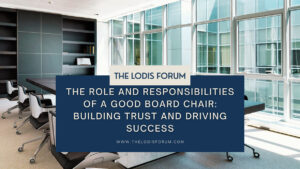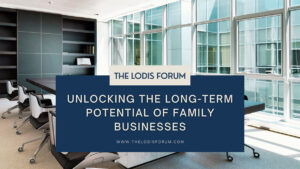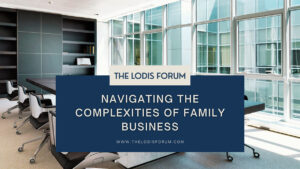Family businesses often face unique challenges that can propel them to heights or lead to their downfall. Brad Fisher, Founding Partner of the Scalable Leadership Group and author of Family Business Abundance: How to Scale Your Company and Succeed Together Across Multiple Generations, shared his valuable insights during a recent Lodis Forum Expert Series on Structural Scalability.
Brad Fisher’s entrepreneurial journey began in 1983 when he started his first company. Over the next twenty years, he founded and sold multiple businesses, gaining extensive experience along the way. His transition to family business consulting was driven by his curiosity about family offices and hedge funds, as introduced by one of his investors.
“After selling my last two companies, I was introduced to the world of family offices and hedge funds. That was over twenty years ago, and I am still deeply involved in that world. It was a fascinating shift for me,” Brad recounted.
Brad’s background gave him a unique perspective on family businesses’ challenges. “My entrepreneurial journey gave me a deep understanding of the operational challenges and opportunities. Transitioning to family business consulting allowed me to apply this knowledge in a new context,” he explained.
Lessons from Personal Experience:
Brad’s interest in family businesses is not just professional; it’s deeply personal. Having grown up in a family business, he witnessed its success and eventual tragic downfall due to poor family dynamics and a lack of clarity. This personal connection fuels his passion for helping family businesses thrive.
“My grandfather started a car dealership in North Dakota that grew significantly over time. However, the lack of clarity and engagement within the family led to its downfall,” Brad shared. This experience fueled his passion for helping family businesses thrive.
“My grandfather did not do a good job bringing his children into the business. By the time my cousins and I grew up, everything was gone. This led me to be very interested in family business dynamics and how to make them work,” he elaborated.
The Power of Simplicity in Complexity:
Brad underlines the power of simplicity in managing the inherent complexity of family businesses. “Family businesses have a secret weapon: trust and strong attachments. When structured properly, they can be incredibly powerful and effective,” Brad shared. However, navigating the inherent complexities requires constant attention and clear strategies. The key is to keep it simple yet effective.
Brad introduced the Six Scalabilities framework, a structured approach to building a scalable and resilient business and family. The Six Scalabilities are:
- Leadership & Culture
- Market Focus & Fit
- Business Model & Finance
- Human Capital
- Technology & Infrastructure
- Work Processes & Innovation
Each one of the Scalabilites is crucial for the success and growth of a family business.
“Business is a human endeavor, and it’s infinitely complex. We need to apply simplicity and frameworks to organize our thinking and manage effectively,” Brad explained. “The Six Scalabilities framework helps break down this complexity into manageable parts.”
- Leadership & Culture:
The foundation of any successful business is strong leadership and a positive culture. This scalability involves forming a robust leadership team and clearly defining the company’s mission, core values, guiding principles, and long-term vision.
“The leadership team should run the business day-to-day while the CEO leads the leadership team,” Brad explained. “Creating a clear purpose set helps everyone understand what we’re working towards.” - Market Focus & Fit:
Understanding your market and aligning your brand with customer needs is crucial. This scalability involves building a strong brand foundation, generating leads, converting them into value-based sales, and fostering a community of advocates.
“Who are our customers? Why do they buy from us? What drives them? These are critical questions every family business must answer to thrive,” Brad noted. “A well-defined market focus ensures that your business is meeting the needs of its customers effectively.” - Business Model & Finance:
A solid business model and effective financial processes are essential for sustainability. This involves ensuring proper capitalization, implementing robust financial controls, and regularly reviewing financial performance to ensure the business is on track.
“Effective financial controls provide the foundation for a sustainable business. Without them, even the best strategies can fail,” Brad emphasized. - Human Capital:
Key elements of human capital management are aligning your team with the company’s mission and values, ensuring they can grow, and organizing them in a scalable way.
“People are the heart of any business. Ensuring they are aligned with your mission and values and have room to grow is essential for scalability,” Brad highlighted. “A motivated and well-aligned team can drive your business to new heights. And it’s essential to base your operation upon a well-engineered, position-based organizational structure.” - Technology & Infrastructure:
Effective use of technology, tools, optimized work processes, and continuous innovation form the backbone of a scalable business. This scalability focuses on building and maintaining the necessary infrastructure to support growth.
“Technology is clearly the star of the show for this Scalability. Technology is obviously crucial in today’s world of rapidly-accelerating change. Technology supports growth and fosters scalability. Even the best strategies can falter without a solid tech strategy,” Brad pointed out. “Investing thoughtfully in this area is essential for long-term success.”
Additional areas of infrastructure include legal and compliance as well as plant and equipment. - Work Processes & Innovation:
Continuous improvement and innovation in work processes ensure the business remains efficient and competitive. This Scalability involves regularly reviewing and optimizing processes to eliminate inefficiencies and stay ahead of the competition.
“Innovation is key to staying relevant in today’s fast-paced business environment. Continuous optimization of your processes ensures that your business remains effective and competitive,” Brad advised.
Transformational Goals (T Goals):
A key component of Brad’s approach is setting “Transformational Goals” (T Goals). These annual priorities align with the company’s long-term vision and drive significant progress yearly.
“We set a clear 10-year vision and then create T-Goals to keep us on track. It’s like driving to Chicago; we know our destination and can adjust our course as needed,” Brad illustrated.
He emphasized the importance of having a clear destination: “Having a clear vision for where you want to be in 10 years is crucial. It allows you to set transformative annual goals and keeps you on track towards that vision.”
Role of the Board in Family Businesses:
The board of directors plays a crucial role in ensuring the success of a family business. They are not just responsible for setting strategy, hiring and firing the CEO, and providing fiduciary oversight. They are the guardians of the company’s future, and their role is paramount in maintaining the company’s trajectory toward success.
“As board members, we must insist on clear, concise reporting and ask the right questions to ensure the company stays on track. Our role is to provide independent, honest appraisal, strategic direction, and effective governance,” Brad emphasized.
Brad also highlighted the importance of the board in maintaining clarity and engagement: “The board can insist on clear reporting and metrics, and they must ask the right questions to ensure the company is on track. This independent oversight is crucial for success.”
Navigating the complexities of family businesses requires a blend of clarity, engagement, and scalability. Brad Fisher’s insights and frameworks offer valuable guidance for family business leaders, owners, and board members.
Focusing on these principles can help family businesses overcome challenges, capitalize on their unique strengths, and achieve long-term success. “Family businesses are not just about the business; they’re about the family. Balancing these two aspects is key to unlocking their full potential,” Brad advised.






